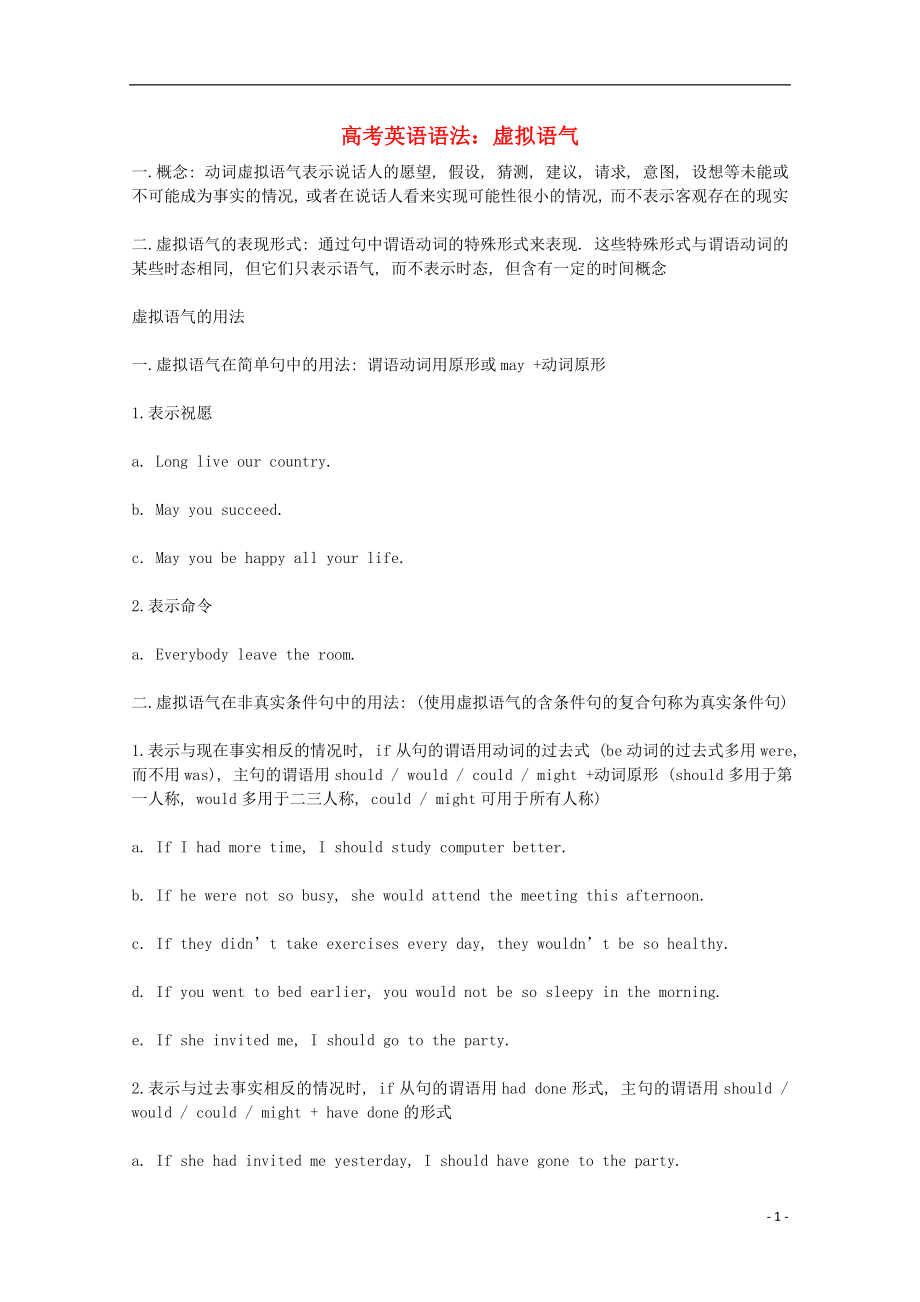《2014高考英語(yǔ) 強(qiáng)效提分指南 語(yǔ)法 虛擬語(yǔ)氣》由會(huì)員分享�,可在線閱讀��,更多相關(guān)《2014高考英語(yǔ) 強(qiáng)效提分指南 語(yǔ)法 虛擬語(yǔ)氣(5頁(yè)珍藏版)》請(qǐng)?jiān)谘b配圖網(wǎng)上搜索�����。
1、
高考英語(yǔ)語(yǔ)法:虛擬語(yǔ)氣
一.概念: 動(dòng)詞虛擬語(yǔ)氣表示說(shuō)話(huà)人的愿望, 假設(shè), 猜測(cè), 建議, 請(qǐng)求, 意圖, 設(shè)想等未能或不可能成為事實(shí)的情況, 或者在說(shuō)話(huà)人看來(lái)實(shí)現(xiàn)可能性很小的情況, 而不表示客觀存在的現(xiàn)實(shí)
二.虛擬語(yǔ)氣的表現(xiàn)形式: 通過(guò)句中謂語(yǔ)動(dòng)詞的特殊形式來(lái)表現(xiàn). 這些特殊形式與謂語(yǔ)動(dòng)詞的某些時(shí)態(tài)相同, 但它們只表示語(yǔ)氣, 而不表示時(shí)態(tài), 但含有一定的時(shí)間概念
虛擬語(yǔ)氣的用法
一.虛擬語(yǔ)氣在簡(jiǎn)單句中的用法: 謂語(yǔ)動(dòng)詞用原形或may +動(dòng)詞原形
1.表示祝愿
a. Long live our country.
b. May you succeed.
2����、
c. May you be happy all your life.
2.表示命令
a. Everybody leave the room.
二.虛擬語(yǔ)氣在非真實(shí)條件句中的用法: (使用虛擬語(yǔ)氣的含條件句的復(fù)合句稱(chēng)為真實(shí)條件句)
1.表示與現(xiàn)在事實(shí)相反的情況時(shí), if從句的謂語(yǔ)用動(dòng)詞的過(guò)去式 (be動(dòng)詞的過(guò)去式多用were, 而不用was), 主句的謂語(yǔ)用should / would / could / might +動(dòng)詞原形 (should多用于第一人稱(chēng), would多用于二三人稱(chēng), could / might可用于所有人稱(chēng))
a. If I had mo
3、re time, I should study computer better.
b. If he were not so busy, she would attend the meeting this afternoon.
c. If they didn’t take exercises every day, they wouldn’t be so healthy.
d. If you went to bed earlier, you would not be so sleepy in the morning.
e. If she invited me, I shou
4�����、ld go to the party.
2.表示與過(guò)去事實(shí)相反的情況時(shí), if從句的謂語(yǔ)用had done形式, 主句的謂語(yǔ)用should / would / could / might + have done的形式
a. If she had invited me yesterday, I should have gone to the party.
b. I would have checked my paper again if I had had more time at yesterday’s exam.
c. If you had taken the tea
5���、cher’s advice, you would not have failed in the exam.
3.表示與將來(lái)事實(shí)相反的情況時(shí), if從句的謂語(yǔ)形式是: ①.完全動(dòng)詞過(guò)去式 (be的過(guò)去式通常用were); ②.should +動(dòng)詞原形; ③.were to do. 其中②, ③種情況都含有出乎意料之外之意; 主句的謂語(yǔ)的形式是: should / would / could / might +動(dòng)詞原形
a. If she should invite me tomorrow, I should go to the party.
b. If it rained /
6�、should rain / were to rain tomorrow, our picnic would be put off.
c. If I saw him tomorrow, I would pass your note to him.
d. I might come back if I were to miss the train.
三.虛擬語(yǔ)氣在非真實(shí)條件句中用法的幾個(gè)變體:
1.條件從句省略if: 在書(shū)面語(yǔ)中, 如果條件從句中的謂語(yǔ)中有were, had, should等詞, 可將if省略, 而把were, had, should放在句首
a. We
7�、re I you (=If I were you ), I would get up early very early.
b. Had you arrived (=If you had arrived ) at the station ten minutes earlier yesterday, you could have caught the train.
2.省略條件從句或主句, 省略部分的含義仍有所體現(xiàn). 省略主句時(shí), 表示己不能實(shí)現(xiàn)的愿望
a. You could have done it yourself (if you had wanted to).
b.
8、 I wouldn’t smoke (if I were you).
c. If my old friends were with me! (要是老朋友和我在一起該多好啊)
d. If you could have seen the wonderful film!
3.主從句時(shí)間不一致時(shí), 主從句謂語(yǔ)動(dòng)詞的形式取決于要表示的具體時(shí)間
a. You would speak English well if you had practised speaking it every day.
b. If she hadn’t trained so hard, she wou
9�����、ldn’t be able to run so fast.
4.假設(shè)的條件不以條件從句, 而以其他方式如介詞短語(yǔ)、從句等表達(dá)出來(lái), 這種句子稱(chēng)為含蓄條件句
a. What would you do with a million dollars?
b. Without music, the world would be a dull place.
c. We could have done better with more money.
d. He would have given you more help, but he has been so busy.
10�����、
四.虛擬語(yǔ)氣在as if / though從句中的用法:
1.表示與現(xiàn)在事實(shí)相反或?qū)ο嘣谇闆r有所懷疑, as if / though從句謂語(yǔ)用過(guò)去式
a. He speaks English so well as if she had studied English in England.
b. She looked as if she were ill.
2.表示與過(guò)去事實(shí)相反的情況, as if / though從句謂語(yǔ)用過(guò)去完成式
a. The machines operated as if it had been repaired.
五.虛擬語(yǔ)氣在
11���、含even if / though從句的復(fù)合句中的用法:
在此類(lèi)復(fù)合句中, 若表示與事實(shí)相反, 可用虛擬語(yǔ)氣形式. 主從句的謂語(yǔ)動(dòng)詞形式與非真實(shí)條件句相同
a. Even if I were rich, I would work.
六.虛擬語(yǔ)氣在主語(yǔ)從句中的用法:
如果表示說(shuō)話(huà)人的看法, 想法或意見(jiàn), 在句型 It is / was + adj. + that從句中, 主語(yǔ)從句中可用虛擬語(yǔ)氣. 主語(yǔ)從句中謂語(yǔ)動(dòng)詞用should do表示現(xiàn)在或?qū)?lái)情況, 用should have done表示過(guò)去情況
a. It is necessary that you shou
12�、ld clean the lab before you left.
b. It is important that you should take the doctor’s advice.
c. It was very strange that he should have left without say goodbye.
七.虛擬語(yǔ)氣在賓語(yǔ)從句中的用法:
1.在wish的賓語(yǔ)從句中, 通常表示不可能實(shí)現(xiàn)或沒(méi)有實(shí)現(xiàn)的愿望, 常用虛擬語(yǔ)氣
①.wish的賓語(yǔ)從句用過(guò)去式, 表示現(xiàn)在或?qū)?lái)沒(méi)有實(shí)現(xiàn)或不可能實(shí)現(xiàn)的愿望
a. I wish I knew the r
13��、esult of the match now.
b. I wish it were spring here all the year round.
c. I wish I could help you.
d. I wish I were young.
②.wish的賓語(yǔ)從句用過(guò)去完成式, 表示過(guò)去沒(méi)有實(shí)現(xiàn)或不可能實(shí)現(xiàn)的愿望
a. We wish we had got the film tickets last night.
b. I wish you I had met him yesterday.
③.wish的賓語(yǔ)從句若用would, 則一般表示請(qǐng)
14����、求, 對(duì)現(xiàn)狀不滿(mǎn)或希望未來(lái)有所改變
a. I wish the prices would come down.
b. I wish you would help me.
c. I wish he would be more careful.
d. We wish you would spend the holiday with us.
2.在動(dòng)詞suggest (建議), advise (建議), demand (要求), require (要求), order (命令), insist (堅(jiān)持)后的賓語(yǔ)從句中, 謂語(yǔ)動(dòng)詞常用( should )+動(dòng)詞原形的虛擬語(yǔ)
15、氣形式
a. I suggested that we should go there at once.
b. I demand that he should answer me at once.
c. The doctor insisted that the patient should stay in bed for two weeks.
d. The officer ordered that the soldiers should stop playing.
與名詞suggestion建議 / advice 建議 / demand要求 / request要求
16���、/ order命令有關(guān)的從句(包括同位語(yǔ)從句和表語(yǔ)從句等)中的謂語(yǔ)也用 ( should ) +動(dòng)詞原形
a. The black people made a strong demand that the government ( should ) take steps to change the unfair situation.
b. Their demand is that the government should take steps to change the unfair situation.
c. I was Bill’s suggestion that ev
17����、erybody should have a map.
d. His suggestion was that everybody should have a map.
八.虛擬語(yǔ)氣用在句型: It is time that(該做某事了)中: that從句中的謂語(yǔ)動(dòng)詞用過(guò)去式
a. It is time we got up.
九.虛擬語(yǔ)氣用在if only引導(dǎo)的感嘆句中: 表示但愿, 要是就好了, 其中謂語(yǔ)形式與wish的賓語(yǔ)從句相同
a. If only he didn’t drive so fast! ( =I wish he didn’t drive so fa
18�����、st.)
b. If only he had taken the doctor’s advice. ( =I wish he had taken the doctor’s advice.)
c. If only the rain would stop! ( =I wish the rain would stop.)
十.虛擬語(yǔ)氣用在would rather / prefer后的that從句中: 表示現(xiàn)在或?qū)?lái)情況謂語(yǔ)動(dòng)詞用過(guò)去時(shí)形式, 表示過(guò)去情況動(dòng)詞用過(guò)去完成時(shí)形式
a. I would rather he came next Saturday.
b. I would prefer you had seen the film yesterday.
c. I would rather that he painted the house blue
- 5 -
 2014高考英語(yǔ) 強(qiáng)效提分指南 語(yǔ)法 虛擬語(yǔ)氣
2014高考英語(yǔ) 強(qiáng)效提分指南 語(yǔ)法 虛擬語(yǔ)氣

